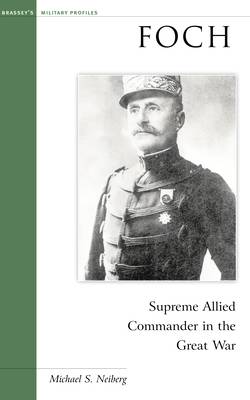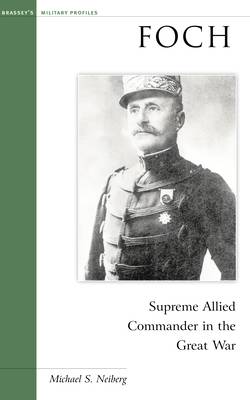
- Retrait gratuit dans votre magasin Club
- 7.000.000 titres dans notre catalogue
- Payer en toute sécurité
- Toujours un magasin près de chez vous
- Retrait gratuit dans votre magasin Club
- 7.000.0000 titres dans notre catalogue
- Payer en toute sécurité
- Toujours un magasin près de chez vous
Description
Ferdinand Foch is the prototype of the twentieth-century general. Better than any other general of the First World War, Foch came to understand how technology and modern alliance systems had changed the nature of warfare. He is most famous for his role as Allied commander in chief in 1918. In this position, unparalleled in the history of warfare, Foch welded together the disparate war efforts of France, Great Britain, the United States, Italy, and Belgium. Now fighting as a more coherent whole, the Allies repulsed the German spring offensives of 1918 and returned to the attack themselves in the summer. In this role, Foch foreshadowed the similar roles played by other commanders of large coalitions, such as Dwight Eisenhower in World War II and Norman Schwarzkopf in Desert Storm. Foch's other important legacy is his public dispute with French prime minister Georges Clemenceau during the armistice and peace negotiations. Foch argued strongly for the creation of Allied bridgeheads across the Rhine River to ensure that a less populous and less industrialized France could defeat a vengeful Germany in the future if necessary. His public quarrels with Clemenceau, who did not share Foch's opinion and did not care for his interference, left the French Third Republic with a civil-military crisis as menacing as the one with which it began World War I. Foch's legacies are both positive and negative, but he left a profound impact on the twentieth century. Michael S. Neiberg masterfully analyzes this complex man and provides a solid overview of French political history against the fabric of the twentieth century's first industrialized war.
Spécifications
Parties prenantes
- Auteur(s) :
- Editeur:
Contenu
- Nombre de pages :
- 124
- Langue:
- Anglais
- Collection :
Caractéristiques
- EAN:
- 9781574886726
- Date de parution :
- 01-10-03
- Format:
- Livre broché
- Format numérique:
- Trade paperback (VS)
- Dimensions :
- 122 mm x 209 mm
- Poids :
- 176 g

Les avis
Nous publions uniquement les avis qui respectent les conditions requises. Consultez nos conditions pour les avis.






